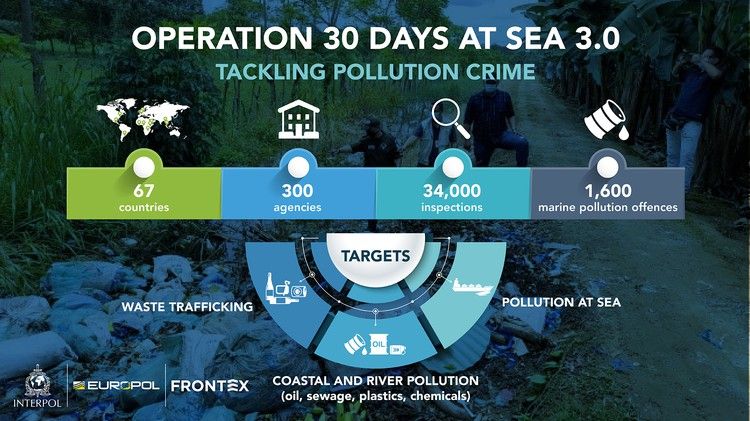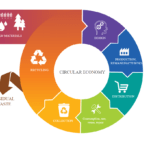Frontex took active part in operation 30 Days at Sea, which was globally coordinated by Interpol. As part of the operation aimed at detecting environmental crime, Frontex planes and vessels monitored nearly 1 000 vessels. The operation’s tactical phase included the detection of 1,600 marine pollution offences, often triggering fines and follow-up investigations around the globe.
Thousands of suspects, companies and criminal networks engaged in maritime pollution have been detected and investigated in a global INTERPOL-led operation.
Operation 30 Days at Sea 3.0 (1-31 March) saw simultaneous action by 300 agencies across 67 countries resulting in an unprecedented 34,000 inspections at sea and inland waterways, coastal areas and ports to detect marine pollution violations.
Frontline action followed five months of intelligence collection and analysis, enabling the identification of specific hotspots and suspects behind the criminal, deliberate pollution of the world’s waterways.
Preliminary results from the operation’s tactical phase included the detection of 1,600 marine pollution offences, often triggering fines and follow-up investigations across all continents. These include:
- Nearly 500 illegal acts of pollution committed at sea, including oil discharges, illegal shipbreaking and sulphur emissions from vessels;
- 1,000 pollution offences in coastal areas and in rivers, including illegal discharges of sewage, mercury, plastics, and other contaminants, leading to serious water contamination which flows into the oceans;
- 130 cases of waste trafficking through ports.
By using INTERPOL’s wide range of databases and analytical capabilities, countries were able to connect pollution crime with other serious offences such as fraud, corruption, tax evasion, money laundering, piracy, and illegal fishing.
With surveillance down, criminals are seizing opportunities
With many enforcement resources being reassigned to tackle the pandemic, criminals have been quick to exploit growing vulnerabilities in environmental security and reduced risk of detection.
Growing trends included COVID-19 disposable items such as masks and gloves, with 13 cases involving medical waste opened as a result of the operation.
With the value of gold on the rise, agencies across Africa, Central and South America worked to track illegal mining, which often results in devastating contamination due to mercury discharges.
INTERPOL Secretary General Jürgen Stock said: “The threat of pollution crime is constantly evolving, endangering the air we breathe, our water and soil. Although this is the third edition of 30 Days at Sea, it is never the same exercise.
“It is thanks to a global yet agile network that we have seen the number of inspections more than double since the first edition: a clear sign that the international community will not stand for criminal attacks on our environment.”
INTERPOL will assist member countries in their follow-up operations and intelligence analysis with support from its Pollution Crime Working Group.







Leave a Reply